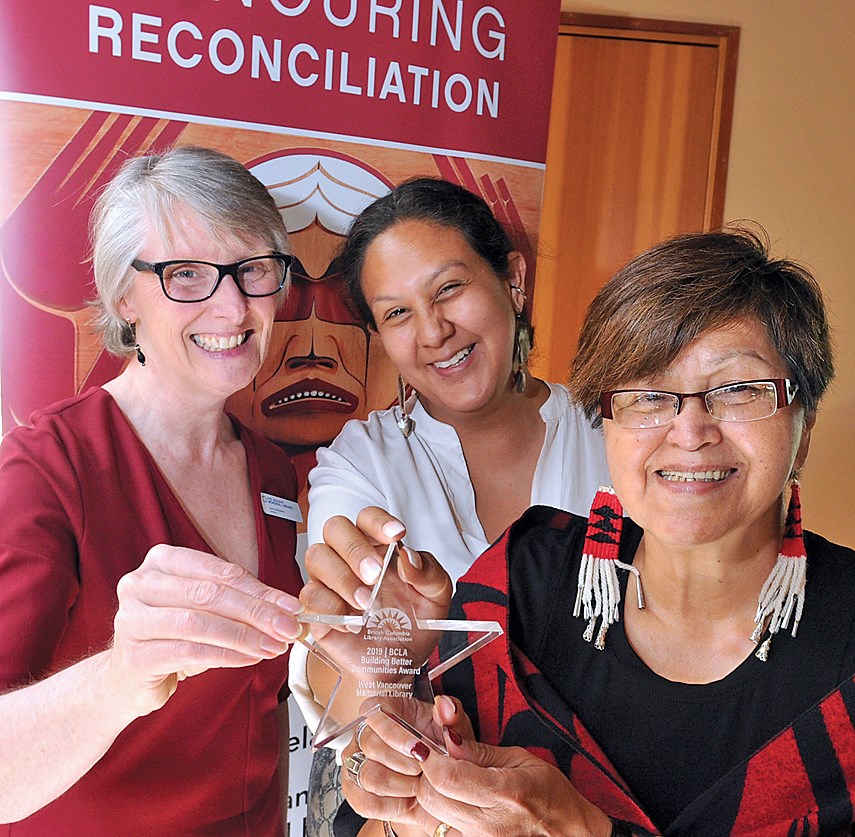West Vancouver Memorial Library, along with Squamish Nation and Reconciliation Canada, have received commendation for its programming designed to expand the community’s understanding of local Indigenous history and Canada’s role in truth and reconciliation.
The library was recently awarded the Building Better Communities Award by the British Columbia Library Association during an annual awards celebration held last month.
The library “initiated the building of a new relationship with Indigenous peoples, one based on trust and mutual respect and focused on establishing a practice of reconciliation,” notes a press release issued by the BCLA.
Pat Cumming, head of customer and community experience at the library, praised the efforts of the local Squamish Nation and Reconciliation Canada, an organization dedicated to revitalizing the relationships between Indigenous peoples and all Canadians, for helping to spearhead the library’s reconciliation programming.
“I think the key was the partnership that we developed,” Cumming told the North Shore News. “It’s just about bringing the expertise that’s in the community to the forefront.”
Bolstered by a $10,000 grant from the West Vancouver Community Foundation in 2017, the library set out to launch its Honouring Reconciliation: Hearing the Truth initiative.
The programming launched that year with a number of community reading circles based on Bev Sellars’ They Called Me Number One, the author’s chilling account of growing up in a church-run residential school whose aim was to “civilize” First Nations children.
“In addition to the reading circles, we had a display from the National Centre for Truth and Reconciliation and we did a film series and then we did a panel discussion” which was attended by Sellars, according to Cumming.
The library also produced a reading list, based on one developed by Chief Robert Joseph of Reconciliation Canada, which aimed to expose patrons to crucial texts for understanding and emphasizing with Indigenous history and experience.
While more public reading circles were initiated to facilitate the Honouring Reconciliation reading list, the library also connected with Chief Janice George of Squamish Nation who then became the library’s cultural program advisor, according to Cumming.
“She suggested that what we might want to do is focus on all of the positive things that are happening in Indigenous communities, and in particular the local Squamish Nation, in terms of cultural revitalization and reawakening,” said Cumming.
Learning circles, which opened to the public last year, offered West Vancouver residents a host of opportunities to learn about a variety of topics, from Indigenous language revitalization to traditional First Nations weaving practices, noted Cumming.
All of the library’s reconciliation programming, in partnership with Squamish Nation and Reconciliation Canada, are ongoing, she added. “From the beginning we recognized that this is not something you do in one year. This is a process.”
In 2003, all North Shore libraries were presented with a Program Award for the North Shore Writers Festival, according to the BCLA website. North Vancouver City Library has nabbed a pair of Building Project awards in 2004 and 2008, while North Vancouver District Library won a Building Project award in 2007, respectively.
On West Vancouver Memorial Library’s recent Building Better Communities Award win, Cumming is just happy the Honouring Reconciliation programming has been so well-received in the community.
“All of the events are very well-attended. There is a real desire on the part of the community to learn about this,” she said.



